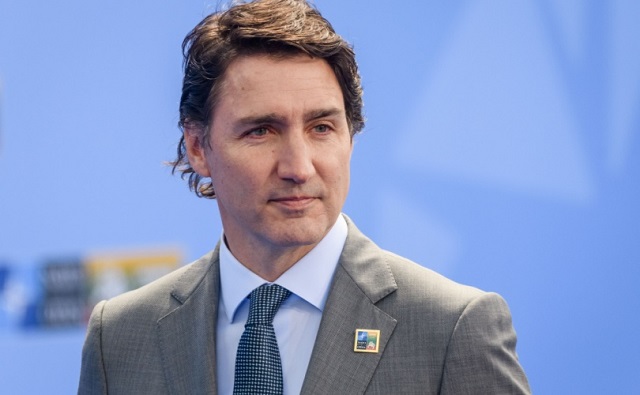Energy
Canadian MPs pass motion demanding Trudeau hold ‘carbon tax emergency meeting’ with all premiers

From LifeSiteNews
The prime minister has five weeks to call a publicly televised meeting with Canada’s 14 premiers to discuss the carbon tax.
A Conservative, non-binding motion demanding Prime Minister Justin Trudeau meet publicly with Canada’s 14 premiers about the carbon tax passed in the House of Commons on April 10.
“That the House declare that the Prime Minister convene a carbon tax emergency meeting with all of Canada’s 14 first ministers,” the text of the motion reads.
According to the motion, titled “Carbon Tax Emergency Meeting,” the meeting will address:”(a) the ongoing carbon tax crisis and the financial burden it places on Canadians (b) the Prime Minister’s recent 23% carbon tax increase (c) plans for provinces to opt-out of the federal carbon tax to pursue other responsible ideas to lower emissions, given that under the government’s current environmental plan.”
The motion mandates that the meeting is publicly televised and held within five weeks of the motion being passed.
Surprisingly, New Democratic Party (NDP) and Bloc Quebecois Members of Parliament (MPs) broke from their usual coalition with the Liberal Party and voted alongside Conservatives in favor of the motion. The motion was passed with 172 votes in favor compared with 150 against.
Conservative leader Pierre Poilievre celebrated the decision on X, formerly known as Twitter, writing, “Common sense Conservative motion on Trudeau convening a televised carbon tax meeting with Canada’s premiers PASSED.”
“Trudeau must listen to Canadians on the financial pain his carbon tax is causing,” he declared.
The demand to meet with Canada’s premiers to discuss the tax comes as Trudeau recently refused invitations from Premiers Scott Moe of Saskatchewan, Danielle Smith of Alberta, Doug Ford of Ontario, Andrew Furey of Newfoundland and Labrador, and Blaine Higgs of New Brunswick to discuss the carbon tax’s detrimental effect on Canadians finances.
Additionally, on April 1, thousands of Canadians took to the streets to protest Trudeau’s 23 percent carbon tax increase on the same day, with some blocking major highways in Maritime and Western provinces.
Trudeau increased the carbon tax despite seven out of 10 provincial premiers and 70 percent of Canadians pleading with him to halt his plan.
Trudeau’s carbon tax, framed as a way to reduce carbon emissions, has cost Canadian households hundreds of dollars annually despite rebates.
The increased costs are only expected to rise. A recent report revealed that a carbon tax of more than $350 per tonne is needed to reach Trudeau’s net-zero goals by 2050.
Currently, Canadians living in provinces under the federal carbon pricing scheme pay $80 per tonne, but the Trudeau government has a goal of $170 per tonne by 2030.
However, despite appeals from politicians and Canadians alike, Trudeau remains determined to increase the carbon tax regardless of its effects on citizens’ lives.
The Trudeau government’s current environmental goals – which are in lockstep with the United Nations’ 2030 Agenda for Sustainable Development – include phasing out coal-fired power plants, reducing fertilizer usage, and curbing natural gas use over the coming decades.
The reduction and eventual elimination of so-called “fossil fuels” and a transition to unreliable “green” energy has also been pushed by the World Economic Forum, the globalist group behind the socialist “Great Reset” agenda in which Trudeau and some of his cabinet are involved.
Alberta
Nobel Prize nods to Alberta innovation in carbon capture

From the Canadian Energy Centre
‘We are excited to bring this made-in-Canada innovation to the world’
To the naked eye, it looks about as exciting as baking soda or table salt.
But to the scientists in the University of Calgary chemistry lab who have spent more than a decade working on it, this white powder is nothing short of amazing.
That’s because the material they invented is garnering global attention as a new solution to help address climate change.
Known as Calgary Framework-20 (CALF-20 for short), it has “an exceptional capacity to absorb carbon dioxide” and was recognized in connection with the 2025 Nobel Prize in Chemistry.
“It’s basically a molecular sponge that can adsorb CO2 very efficiently,” said Dr. George Shimizu, a UCalgary chemistry professor who leads the research group that first developed CALF-20 in 2013.
The team has been refining its effectiveness ever since.
“CALF-20 is a very exciting compound to work on because it has been a great example of translating basic science into something that works to solve a problem in the real world,” Shimizu said.
Advancing CCS
Carbon capture and storage (CCS) is not a new science in Alberta. Since 2015, operating projects in the province have removed 15 million tonnes of CO2 that would have otherwise been emitted to the atmosphere.
Alberta has nearly 60 proposed facilities for new CCS networks including the Pathways oil sands project, according to the Regina-based International CCS Knowledge Centre.
This year’s Nobel Prize in Chemistry went to three of Shimizu’s colleagues in Japan, Australia and the United States, for developing the earliest versions of materials like CALF-20 between 1989 and 2003.
Custom-built molecules
CALF-20 is in a class called metal-organic frameworks (MOFs) — custom-built molecules that are particularly good at capturing and storing specific substances.
MOFs are leading to new technologies for harvesting water from air in the desert, storing toxic gases, and capturing CO2 from industrial exhaust or directly from the atmosphere.
CALF-20 is one of the few MOF compounds that has advanced to commercial use.
“There has been so much discussion about all the possible uses of MOFs, but there has been a lot of hype versus reality, and CALF-20 is the first to be proven stable and effective enough to be used at an industrial scale,” Shimizu said.
It has been licensed to companies capturing carbon across a range of industries, with the raw material now being produced by the tonne by chemical giant BASF.
Carbon capture filter gigafactory
Svante Inc. has demonstrated its CALF-20-based carbon capture system at a cement plant in British Columbia.
The company recently opened a “gigafactory” in Burnaby equipped to manufacture enough carbon capture and removal filters for up to 10 million tonnes of CO2 annually, equivalent to the emissions of more than 2.3 million cars.
The filters are designed to trap CO2 directly from industrial emissions and the atmosphere, the company says.
Svante chief operating officer Richard Laliberté called the Nobel committee’s recognition “a profound validation” for the entire field of carbon capture and removal.
CALF-20 expansion
Meanwhile, one of Shimizu’s former PhD students helped launch a spinoff company, Existent Sorbents, to further expand the applications of CALF-20.
Existent is working with oil sands producers, a major steel factory and a U.S.-based firm capturing emissions from other point sources, said CEO Adrien Côté.
“The first users of CALF-20 are leaders who took the risk of introducing new technology to industries that are shrewd about their top and bottom lines,” Côté said.
“It has been a long journey, but we are at the point where CALF-20 has proven to be resilient and able to survive in harsh real-world conditions, and we are excited to bring this made-in-Canada innovation to the world.”
Business
Bill Gates walks away from the climate cult

Billionaire Bill Gates — long one of the loudest voices warning of climate catastrophe — now says the world has bigger problems to worry about. In a 17-page memo released Tuesday, the Microsoft co-founder called for a “strategic pivot” away from the obsessive focus on reducing global temperatures, urging leaders instead to prioritize fighting poverty and eradicating disease in the developing world. “Climate change is a serious problem, but it’s not the end of humanity,” Gates wrote.
Gates, 70, argued that global leaders have lost perspective by treating climate change as an existential crisis while millions continue to suffer from preventable diseases like malaria. “If I had to choose between eradicating malaria and preventing a tenth of a degree of warming, I’d let the temperature go up 0.1 degree,” he told reporters ahead of next month’s U.N. climate conference in Brazil. “People don’t understand the suffering that exists today.”
For decades, Gates has positioned himself as a leading advocate for global climate initiatives, investing billions in green energy projects and warning of the dangers of rising emissions. Yet his latest comments mark a striking reversal — and a rare admission that the world’s climate panic may have gone too far. “If you think climate is not important, you won’t agree with the memo,” Gates told journalists. “If you think climate is the only cause and apocalyptic, you won’t agree with the memo. It’s a pragmatic view from someone trying to maximize the money and innovation that helps poor countries.”
The billionaire’s change in tone is sure to raise eyebrows ahead of the U.N. conference, where climate activists plan to push for new emissions targets and wealth transfers from developed nations. Critics have long accused Gates and other elites of hypocrisy for lecturing the public about fossil fuels while traveling the globe on private jets. Now, Gates himself appears to be distancing from the doomsday rhetoric he once helped spread, effectively admitting that humanity faces more immediate moral imperatives than the weather.
(AP Photo/Alex Brandon)
Stunning Climate Change pivot from Bill Gates. Poverty and disease should be top concern.
-

 Alberta2 days ago
Alberta2 days agoGondek’s exit as mayor marks a turning point for Calgary
-

 Agriculture2 days ago
Agriculture2 days agoCloned foods are coming to a grocer near you
-

 Business24 hours ago
Business24 hours agoYou Won’t Believe What Canada’s Embassy in Brazil Has Been Up To
-

 Censorship Industrial Complex23 hours ago
Censorship Industrial Complex23 hours agoSenate Grills Meta and Google Over Biden Administration’s Role in COVID-Era Content Censorship
-

 Business22 hours ago
Business22 hours agoMystery cloaks Doug Ford’s funding of media through Ontario advertising subsidy
-

 Automotive1 day ago
Automotive1 day agoCarney’s Budget Risks Another Costly EV Bet
-

 Crime10 hours ago
Crime10 hours agoPublic Execution of Anti-Cartel Mayor in Michoacán Prompts U.S. Offer to Intervene Against Cartels
-

 Environment18 hours ago
Environment18 hours agoThe era of Climate Change Alarmism is over











